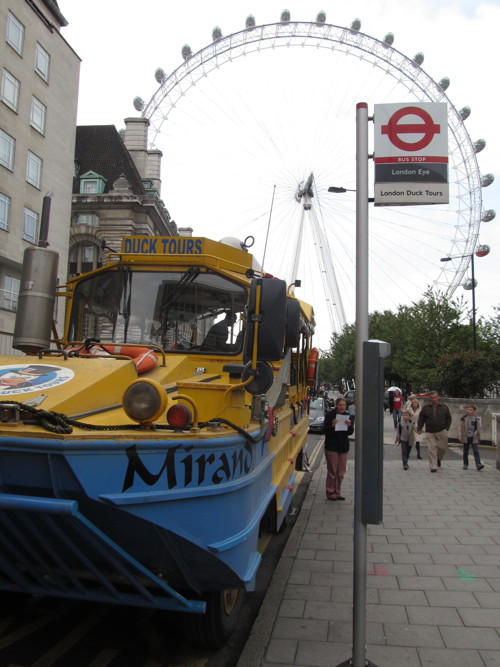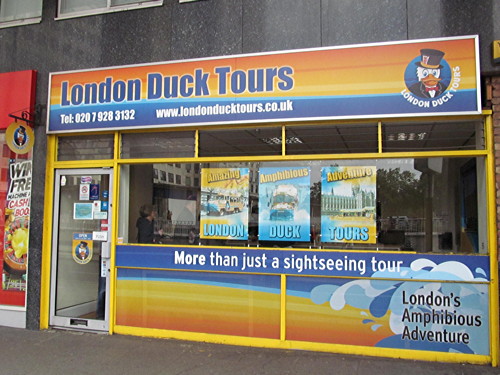London Duck Tours: river ban is costing us £12,500 a day
The owner of the London Duck Tours company - whose fleet of amphibious vehicles is currently banned from the Thames - has told the London Assembly that his firm is spending £12,500 a day to keep his 60 staff employed.


The London Assembly set up a special Thames passenger boat investigation committee to examine how the emergency services responded to a fire on board the Cleopatra amphibious vehicle on Sunday 29 September.
Passengers on the rebuilt DUKW World War II vessel jumped into the Thames near the Houses of Parliament to escape the thick smoke.
Thanks to a swift response by emergency services and the crews of RIB pleasure boats in the area at the time, the passengers were soon rescued and the fire was extinguished after just eight and a half minutes.
At Wednesday afternoon's two-hour hearing the committee heard from representatives of London Duck Tours, the London Fire Brigade, the Port of London Authority, the RNLI and the Maritime and Coastguard Agency.
"Thames boat trips are a must for many visitors to London and it is essential that all the organisations involved in safety on the river learn lessons from the fire aboard a 'duck tour' boat last month to ensure it cannot happen again," said Victoria Borwick AM, chair of the committee.
"We heard a detailed account of the response to the fire, the safety requirements and regulatory framework for the vehicle involved, as well as accounts from a passenger involved.
"The vast majority of trips pass off without incident, but I hope our investigation – and subsequent report – will go some way towards ensuring that river tours aboard these unique vessels remain safe and enjoyable for all involved."
John Bigos, managing director of London Duck Tours, claimed that his company has a very good 13-year safety record operating amphibious vehicles on the Thames.
The Waterloo-based company has an annual turnover of £4 million and is a member of the South Bank Employers' Group.
Its tours start and finish at Chicheley Street and the firm has an office and shop at Elizabeth House in York Road.
"This is the first and will be the only serious incident we will have," said Mr Bigos.
The distinctive yellow amphibious vehicles have been prohibited from using the river since the fire on 29 October.
Mr Bigos said that the company – which continued to run road-based tours – had carried just 444 passengers during October compared to 20,000 in the same period last year.
"We're not doing any trading in November which was £220,000 last year," said Mr Bigos. He added: "We won't see a penny this year."
However, at the time of writing, tickets for land-based tours using the amphibious vehicles were still on sale on the company's website.
"We are going to be spending – if we retain our staff, which we have agreed to do – something like £600,000-700,000," said Mr Bigos.
Mr Bigos called on the Maritime and Coastguard Agency to work efficiently to agree revised safety measures for the use of the vehicles on the river: "We ask that they act promptly and swiftly, because this is costing us £12,500 a day."
He told the City Hall hearing that the firm could resume operations in the New Year, but sounded a gloomy note about the potential reputational damage caused by the fire: "Whether the passengers want to come back – and how we are going to get the branding sorted – is anybody's guess at this time," he said.
The Marine Accident Investigation Branch (MAIB) recently published a safety bulletin as part of its investigations into the sinking of a similar amphibious vehicle in Liverpool in June and the London fire in September.
Following the incident in Liverpool, extra foam had been installed in the hulls of the London Duck Tours fleet.
According to MAIB's safety bulletin published last month, the investigation into the 29 September fire "...has established that the seat of the fire was located under the crew seating platform close to a drive shaft coupling. Foam in the area was found to be heavily contaminated with grease and had fuelled the fire, generating thick black smoke".
MAIB's bulletin cited a report commissioned by the London Fire Brigade and completed by Bureau Veritas' fire science department which concluded that: "There was no obvious ignition source in the vicinity of the buoyancy foam, and therefore the most likely cause of fire was the action of the rotating drive shaft (or other moving parts) on the oil contaminated surfaces of the buoyancy foam blocks."
MAIB's latest recommendation is that the Martime and Coastguard Agency should "...ensure that the means used by DUKW operators to achieve the required standard of buoyancy and stability for their vessels does not adversely impact on their safe operation. Furthermore, these vessels should not be permitted to operate until satisfactory levels of safety can be assured under all feasible operating conditions."
Alongside the MAIB investigation, the London Assembly committee will now produce its own report examining possible measures to improve safety on the Thames.
Comments
Share
The SE1 website is supported by people like you
More to read
- Megabus to launch £1 London sightseeing tours 10 Apr 2018
- London Duck Tours to vanish from Thames after losing slipway access 22 Aug 2017
- Tory MP blasts 'noisy and polluting' London Duck Tours 29 Apr 2016
- Sculptures installed on river foreshore for Totally Thames month 2 Sep 2015
- South Bank landowners team up to keep residents informed 27 Oct 2014
- London Assembly publishes report on Duck Tours fire 16 Dec 2013
- Drama on the Thames as Duck Tours amphibious vehicle catches fire 29 Sep 2013
- Thames Water's 'super sewer' exhibition draws a crowd 27 Nov 2011
- Alfred Salter Playground could be spared from 'super sewer' work 3 Apr 2011
- London Duck Tours named Lambeth Business of the Year 27 Feb 2010
Follow us
Email newsletter
For the latest local news and events direct to your inbox every Monday, you need our weekly email newsletter SE1 Direct.

